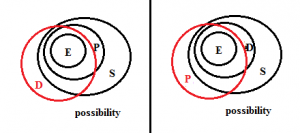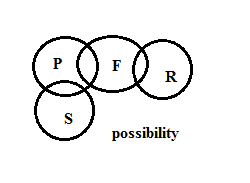Hello Aspirants. Welcome to Online Reasoning Section in AffairsCloud.com. We are providing Free IBPS Clerk course 2015 and creating sample questions in Reasoning, the type of which will be asked in IBPS Clerk Prelims Exam.
Stratus – IBPS Clerk Course 2015

[flipclock]
Directions (1 – 5):
(A) only 1st follows
(B) only 2nd follows
(C) either 1st or 2nd
(D) neither 1st nor 2nd
(E) both 1st and 2nd
- Statements: All flowers are trees. No tree is a house. Some houses are wheels
Conclusions:
I. Some trees are flowers
II. Some wheels are not trees(E) both 1st and 2nd
Explanation:
I follows from 1st statement.
All wheels are trees is not a possibility (because if all wheels are trees then some trees will be houses) so Some wheels are not trees follows. - Statements: All erasers are pens. All erasers are dusters. Some erasers are sharpeners.
Conclusions:
I. Some pens are not sharpeners.
II. Some dusters are not sharpeners.(D) neither 1st nor 2nd
Explanation:
There is a possibility that all pens are sharpeners. So Some pens are not sharpeners do not follow. Same with second conclusion. - Statements: Some towers are flowers. No flower is tree. Some trees are petals.
Conclusions:
I. Some petals are towers
II. Some trees are not towers(D) neither 1st nor 2nd
Explanation:
I is not definite
II – All trees are towers is a possibility, so some trees are not towers does not follow. - Statements: Some palaces are forts. Some forts are red. No red is strong.
Conclusions:
I. Some palaces being strong is a possibility
II. Some forts are strong.(A) only 1st follows
Explanation:
From venn, I is a possibility
II is not definite - Statements: Some jobs are vacancies. All jobs are works. No work is a trade. All professions are trades.
Conclusions:
I. Some works are profession is a possibility.
II. Some vacancies are works(B) only 2nd follows
Explanation:
If some works are professions, then some works will be trades also, which is not possible acc. to 3rd statement. So 1st conc. does not follow
II is definite
Directions (Q. 6-10): In the following questions, the symbols @, #, %, $ and © are used with the following meaning as illustrated below.
‘P # Q’ means ‘P is neither greater than nor equal to Q’.
‘P © Q’ means ‘P is neither equal to nor smaller than Q’.
‘P % Q’ means ‘P is neither smaller than nor greater than Q’
‘P $ Q’ means ‘P is not smaller than Q’.
‘P @ Q’ means ‘P is not greater than Q’.
Now in each of the following questions assuming the given statements to be true, find which of the three conclusions I, II and III given below them is/are definitely true and give your answer accordingly.
- Statements : K # T, T $ A, A @ F
Conclusions:
I. F $ T
II. K # A
III. T $ F
A) None is true
B) Only I is true
C) Only I and II are true
D) Only II and III are true
E) All are trueA) None is true
Explanation:
K < T ≥ A ≤ F gives no relationship between any of K T A F - Statements: R @ S, S © W, B $ W
Conclusions:
I. W # R
II. B © S
III. W $ R
A) None is true
B) Only I is true
C) Only III is true
D) Only either I or III is true
E) All are trueD) Only either I or III is true
Explanation:
R ≤ S > W ≤ B
R and W both are less than S, so either W is less than S or it is greater than S - Statements: H $ V, V % N, K © N
Conclusions:
I. K © V
II. N @ H
III. H © K
A) Only I and III are true
B) Only II and III are true
C) Only I and II are true
D) All are true
E) None of theseC) Only I and II are true
Explanation:
H ≥ V = N < K gives K > V
N ≤ H
H and K both less than V, so it gives no definite relationship between H and K - Statements : S # F, K @ F, D © K
Conclusions:
I. S # K
II. F # D
III. D © S
A) None is true
B) Only I is true
C) Only III is true
D) Only either I or III is true
E) All are trueA) None is true
Explanation:
S < F ≥ K < D - Statements : M © A, A % D, D @ P
Conclusions:
I. M © P
II. P $ A
III. M © D
A) Only I and II is true
B) Only II and III is true
C) Only I and III is true
D) All are true
E) None of theseB) Only II and III is true
Explanation:
M > A = D ≤ P gives
No relationship between M and P
P ≥ A
M > D




